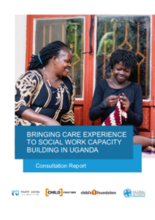Global and regional guidance shows that maximum efforts must be made to keep children in caring and protective families, and to provide safe and high-quality alternative care when this is not possible. In many countries, including Uganda, further efforts are needed before these goals can be achieved. Too many children remain in harmful institutional care, living alone on the streets, or in families where they are vulnerable to abuse, neglect or exploitation. Young people leaving care to live independently for the first time are also poorly supported. Social workers play a vital role in supporting vulnerable families, children in different care settings, reintegrated children and young adults who had spent time in children’s homes and now live in the community (care leavers). For these contributions to be relevant and effective, it is vital that social workers first understand what children, young adult care leavers, and parents or other family members caring for children (caregivers) want and need from them.
To explore these expectations, Child’s i Foundation consulted 133 children, young adult care leavers and caregivers in Uganda. These individuals all had experience of living in vulnerable families, living in residential care, family reintegration, or leaving care to live independently as adults. They are referred to collectively as ‘care-experienced individuals’ throughout this report. The consultations are part of a broader initiative designed to bring the voices of care experienced individuals to social worker capacity building. The findings have been used to develop training tools that encourage social workers to change their practices to better meet the needs and wishes of care experienced individuals. The findings are also being used to advocate for broader changes to policies and guidance around the role and capacities of social workers. It is recognised that it may not be possible or advisable for social workers to fulfil all of the roles or display all of the characteristics asked of them by the participants during the consultations. The ramifications of the findings for policy and practice are explored at the end of the document.
The consultations and broader project were initiated by the Global Social Service Workforce Alliance (GSSWA), with funding from the Martin James Foundation.
See also:

